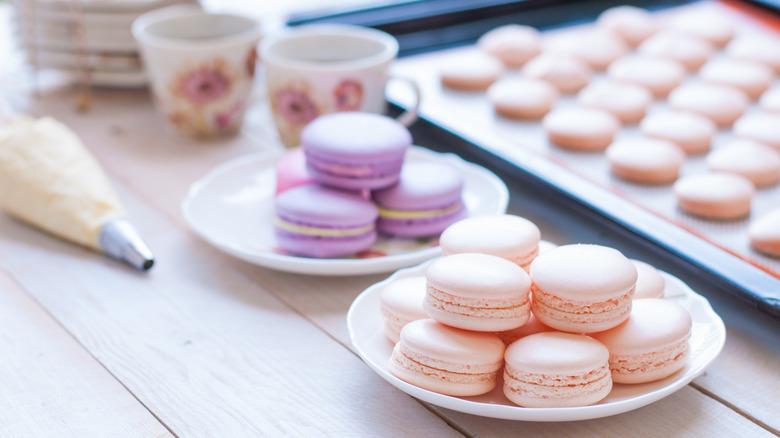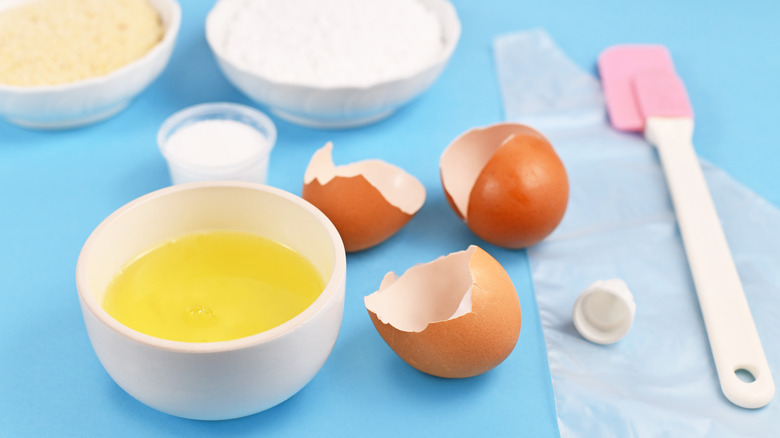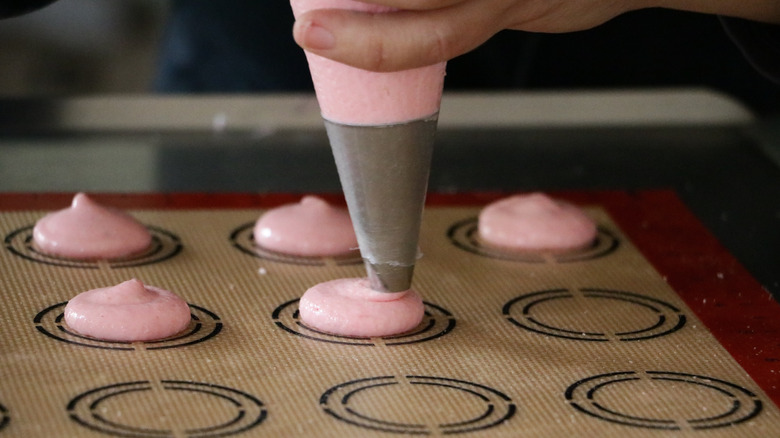The Egg Mistake You Should Avoid When Making Macarons
When it comes to sweet treats, macarons (not to be confused with macaroons) are the epitome of elegance. Cute and colorful, with a signature crisp-yet-chewy and light texture, these French sandwich cookies start with a meringue base. The recipe consists of four basic ingredients: almond flour, egg whites, confectioners' sugar, and granulated sugar. The eggs are really where the magic happens — and also where many cooks fail.
Lofty, airy beaten egg whites play a central role in this dessert, and even if you're good at separating them from the yolks, you're making a mistake if you do so right before you start baking. To get the best results when making macarons, you should let the egg whites "age" before you begin.
Aging the egg whites doesn't mean you need to use old eggs; on the contrary, fresh eggs work the best for whipping, as their slight acidity helps them increase in volume, plus the taste is more pleasant. Rather, aging in this context means separating the whites in advance, then letting them sit covered in the refrigerator for a day or two. This evaporates some of their moisture content, and when making meringues, less water makes for a more stable consistency and superior stiffness once they're whipped. And a better meringue means a better, less finicky macaron.
How to age egg whites in and out of the fridge
Separating eggs is best done when they're cold, as it makes the job much easier. If you want to age the whites for macarons, the best method is to pour them into a clean bowl or other container, and cover them. They can sit happily in the refrigerator for two to three days. Just remember to also save the yolks when a recipe only calls for whites; they will keep in the refrigerator for a few days when covered with a little water.
While some recipes for macarons suggest leaving the egg whites at room temperature for a day to age, this is not recommended for food safety. The USDA advises that eggs should not be left at room temperature for more than two hours, just to stay safe. If you've not planned ahead and still want to make macarons, you can use a shortcut to can age them faster.
Let the egg whites come to room temperature, uncovered, for two hours (and no more — remember food safety rules). Then, add them to a mixing bowl which has been warmed to 75 to 76 degrees Fahrenheit. You can achieve this by running the bowl under hot water, and then drying it when it's the right temperature, as measured with a thermometer. This will make the whites thick enough for a well-structured meringue.
More tips for making next-level macarons
If you've gone through the trouble of aging egg whites, it's worth knowing that they should be whipped at room temperature, and not straight from the fridge. Trying to whip whites that are too cold is a mistake that can ruin meringues, since forming the air bubbles takes much longer, and it also prevents you achieving the kind of light, airy volume you want.
If you want to add a pop of color to the shell of your homemade macarons, food coloring is an easy option, but you need to use the right kind. Runny liquid food coloring can alter the texture of the delicate meringue batter, as it adds excess moisture. The best bet is to use gel food coloring, which is thicker and will keep the batter at a good consistency. You only need to use a small amount for a vibrant hue; just make sure to go for a gel that is not oil-based, which can inhibit whipping.
When it comes to forming the pretty, round shapes of your cookies, use a piping bag with a ½ inch tip and a special macaron mat which has circle shapes stenciled on. If you don't have a mat, try printing out a template instead, put it on your baking sheet, and place parchment paper over it so that you can pipe the batter into each circle. Then, simply slip the template out and get to baking.



